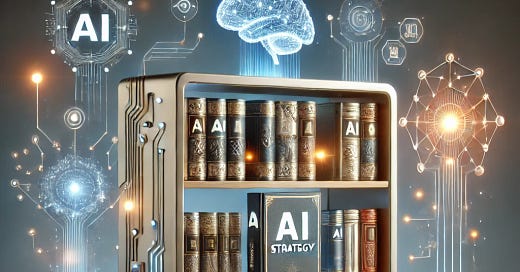The Non-Engineer's Guide to Learning AI: 3 Books Every Leader Should Read
You Don’t Need to Code to Lead in AI: 3 Books to Get You Started
Image credit: Author + AI
AI isn’t just transforming industries—it’s revolutionizing leadership, innovation, and problem-solving across every sector. The best part? You don’t need to code to stay ahead in today’s rapidly evolving, AI-driven world.
Instead, you need curiosity, trusted resources, and the willingness to discover how AI can empower leaders and amplify decision-making.
I’ve been there myself. As a non-engineer, I led a team of over 700 engineers at LinkedIn. I learned that leadership in tech isn’t simply about writing code—it’s about fostering collaboration, empowering teams, and driving innovation toward meaningful outcomes. That experience taught me what’s possible for non-technical leaders and how to succeed in a technology-powered world.
Why These Books?
As a non-engineer who’s successfully led technical teams, I know firsthand how intimidating it can feel to navigate a world powered by code. These books prove one thing: you don’t need to be a programmer or an engineer to succeed in AI leadership.
They provide the tools, perspectives, and inspiration to help non-engineers understand artificial intelligence, build confidence, and take action. Whether you’re an aspiring leader, a decision-maker, or someone curious about the future, these reads will prepare you to navigate change with confidence.
Book 1. The Coming Wave by Mustafa Suleyman
Why It Stands Out
Suleyman provides a big-picture view of how AI and biotechnology are reshaping industries and society. This book equips non-engineer leaders with a deeper understanding of the ethical and strategic challenges these technologies bring, helping them think beyond immediate business impacts to consider long-term global shifts.
Key Insight
AI isn’t just a tool; it’s a force that will redefine leadership. Suleyman’s perspective helps leaders prepare for the future by recognizing the power dynamics, risks, and opportunities AI introduces.
Pro Tip: The book’s big-picture focus can feel abstract at times. Leaders will benefit most by pairing its insights with practical resources and strategies to connect the broader implications of AI to their organizational goals.
Book 2. Impromptu: Amplifying Our Humanity Through AI by Reid Hoffman
Why It Stands Out
Hoffman takes a uniquely practical approach, showing how generative AI can be used by anyone—not just engineers—to enhance creativity and productivity. What makes this book particularly intriguing is that Hoffman co-wrote it with GPT-4, demonstrating AI’s collaborative potential in real time.
Key Insight
AI can amplify what makes you human—your creativity, problem-solving, and vision. By using AI as a co-author, Hoffman exemplifies how leaders can integrate generative tools into their workflows to innovate and differentiate themselves.
Pro Tip: The examples are inspiring but may feel intimidating for those new to AI. Leaders will benefit most by combining this book with hands-on experimentation using no-code tools or platforms. Start with The Non-Engineer’s Guide to Learning AI, Part 1 and Part 2 for free resources to get started.
Book 3. Superagency: What Could Possibly Go Right with Our AI Future by Reid Hoffman and Greg Beato
Why It Stands Out
Hoffman and Beato deliver a roadmap for using AI inclusively and adaptively to create positive societal change. The book explores how AI can amplify individual agency by personalizing education, accelerating medical breakthroughs, and simplifying complex decision-making. It challenges leaders—especially non-engineers—to reframe AI as a collaborative tool that unlocks opportunities, rather than a disruptive force.
Key Insight
AI has the power to amplify human ingenuity and create meaningful societal impact. For non-engineer leaders, this book emphasizes how strategic thinking and a focus on opportunity can turn AI into a tool for empowerment and positive change.
Pro Tip: While inspiring, the book doesn’t always provide step-by-step tactics. Leaders may need to seek additional resources to translate its ideas into practical strategies for their teams.
The Takeaway
AI isn’t just transforming industries—it’s reshaping how leaders think, act, and make an impact. These books prove one thing: you don’t need to code to succeed in an AI-driven world—you need courage, clarity, and the right tools. By equipping yourself with knowledge and a strategic mindset, you can lead boldly and differentiate yourself in a tech-powered future.
Ready to Drive Strategic Impact as a Non-Engineer Leader?
As a non-engineer leader, you don’t need to code to drive impact—you need the right strategies. Join me for the Strategy & Planning Bootcamp, a live course co-taught with Sam Liu, MBA Adj. Prof. at Columbia & Partner at Mercer, where we’ll teach you how top companies shape strategy and deliver results.
📘 Learn more and enroll—and see why non-technical leaders trust this course to sharpen their strategic edge and thrive in an AI-driven world.
Strategy Toolkit
Not ready for a course but want AI tools to accelerate your strategic thinking? Check out the Strategy Toolkit to help you identify strategic priorities quickly and make an impact where it counts.
Read widely. Learn deeply. Be On Point.
Joselle




